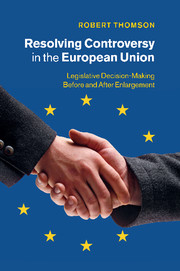 Resolving Controversy in the European Union
Resolving Controversy in the European Union Published online by Cambridge University Press: 07 October 2011
The previous chapters examined the inputs, processes and outputs of the political system of the European Union (EU) with theories and methods of modern political science. Each chapter focused on an important aspect of the political system. It is now time to bring together the main findings and consider their implications. The three sections of this chapter summarize the main findings and dwell on their implications for three areas of knowledge regarding EU politics: enlargement, the democratic deficit and proposals for improving how the EU works.
Continuity and change in European Union decision-making since enlargement
There has been more continuity since the main 2004 enlargement than some observers and practitioners feared there would be. Three defining characteristics of the political system that helped make the EU successful have endured. First, inputs are diverse. Part I of this book examined inputs in the form of political actors’ policy demands regarding controversies raised by legislative proposals. There are only weak structures in these policy demands. This means that two member states that disagree with each other on one controversy are likely to agree on another controversy, even on a related matter. Variation in political actors’ policy demands is central to pluralist democratic theory (Dahl 1989: 251–4). According to pluralist theory, decisions are not controlled by a powerful elite group of actors with similar policy preferences on most of the important issues dealt with in the political system. Instead, different groups of actors share similar preferences depending on the issue at stake.
To save this book to your Kindle, first ensure [email protected] is added to your Approved Personal Document E-mail List under your Personal Document Settings on the Manage Your Content and Devices page of your Amazon account. Then enter the ‘name’ part of your Kindle email address below. Find out more about saving to your Kindle.
Note you can select to save to either the @free.kindle.com or @kindle.com variations. ‘@free.kindle.com’ emails are free but can only be saved to your device when it is connected to wi-fi. ‘@kindle.com’ emails can be delivered even when you are not connected to wi-fi, but note that service fees apply.
Find out more about the Kindle Personal Document Service.
To save content items to your account, please confirm that you agree to abide by our usage policies. If this is the first time you use this feature, you will be asked to authorise Cambridge Core to connect with your account. Find out more about saving content to Dropbox.
To save content items to your account, please confirm that you agree to abide by our usage policies. If this is the first time you use this feature, you will be asked to authorise Cambridge Core to connect with your account. Find out more about saving content to Google Drive.